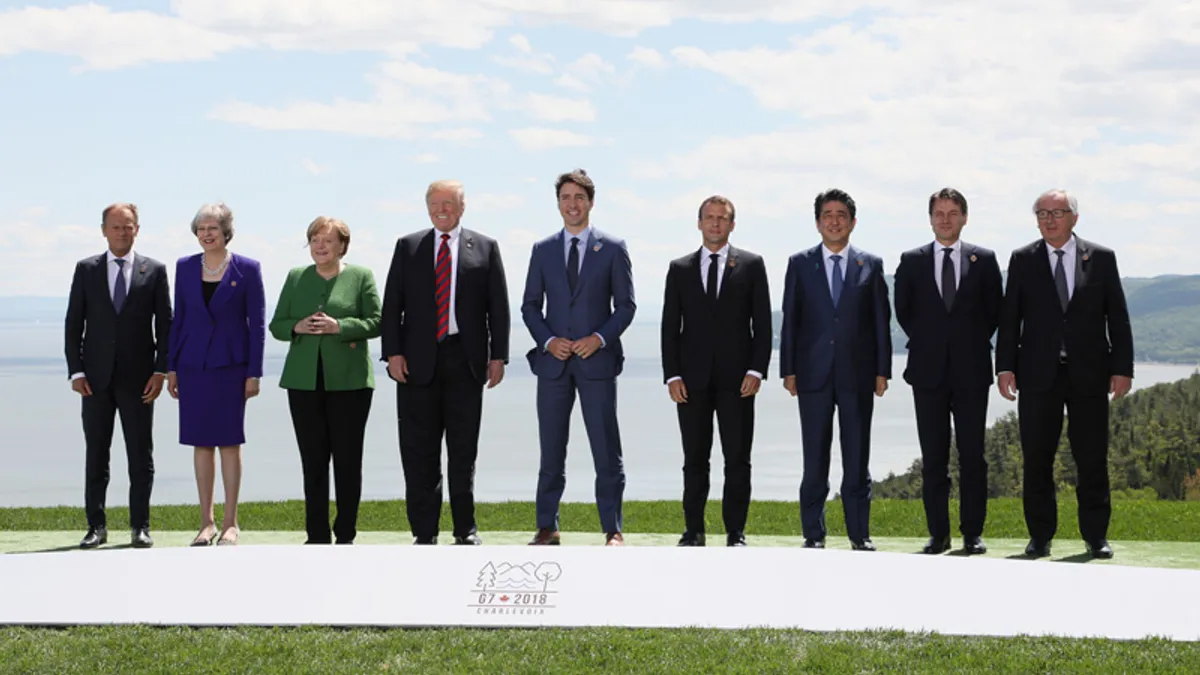Dive Brief:
- Five of the G7 countries — Canada, France, Germany, Italy and the UK — signed the Ocean Plastics Charter, a pledge with goals for reducing the environmental impact of plastic products on oceans. The U.S. and Japan abstained from signing the non-binding charter, which lists initiatives for better managing plastics through sustainable design, production, innovation and collection.
- Specific goals include working with industry to achieve 100% reusable or recyclable plastics by 2030, increasing plastic products' recycled content by at least 50% by 2030, recycling and reusing at least 55% of plastic packaging by 2030, and recovering 100% of all plastics by 2040.
- Non-industry goals include public education campaigns on marine litter and implementing coastal clean-up programs.
Dive Insight:
A footnote on the agreement indicates the U.S. supports healthy oceans and coastal cities, but it will not participate in the charter, going along with President Trump's announcement last year that America intended to withdraw from the Paris climate agreement. A Japanese minister told a Canadian paper his country believes in the environmental objectives, but did not agree to the charter because of the document's call for plastics regulations that could negatively affect commodities and industry.
Opinions on the charter and its effectiveness vary widely. The Chemistry Industry Association of Canada and Canadian Plastics Industry Association support the measure, while the American Chemistry Council appeared cautiously optimistic and Greenpeace was unimpressed. Although all entities applaud the goal of cleaner oceans, a number of them believe the charter could go further and instate more concrete policies.
"It’s time for the world’s largest economies to recognize that we cannot simply recycle our way out of this problem ... Governments must move beyond voluntary agreements to legislate binding reduction targets and bans on single-use plastics, invest in new and reuse delivery models for products, and hold corporations accountable for the problem they have created," Greenpeace International Executive Director Jennifer Morgan said in a statement.
Large portions of the charter cover plastics recycling and post-consumer collection, but it did also mention the importance of reducing waste overall and identifying alternatives to single-use plastic products. One action item calls for an analysis of plastic consumption and "identifying and encouraging the elimination of unnecessary uses."
Several of the action items allude to greater product stewardship and producer responsibility in plastics design and production. Extended producer responsibility (EPR) policies put a greater obligation on producers for ensuring proper disposal or treatment of their products after use; it's viewed as a way to cut down on waste at its source and promote more thoughtful and sustainable product designs. EPR is more widely practiced in other countries, especially in Europe, but the concept is just catching on in the U.S. Because the U.S. refrained from being included in the ocean charter, it will not be a measure that decisively pushes the country to engage in more EPR-forward practices.
The charter suggests about two dozen general ideas for better sustainability and to prevent plastics from ending up in oceans. But, as Greenpeace representatives have noted, the ideas are only as good as leaders' follow through and ability to transform general concepts into concrete policies.















